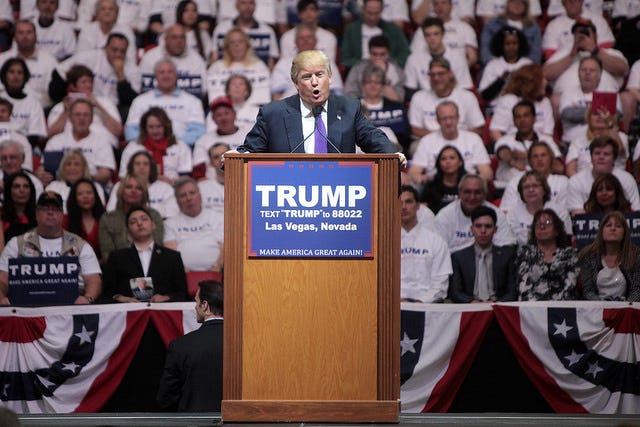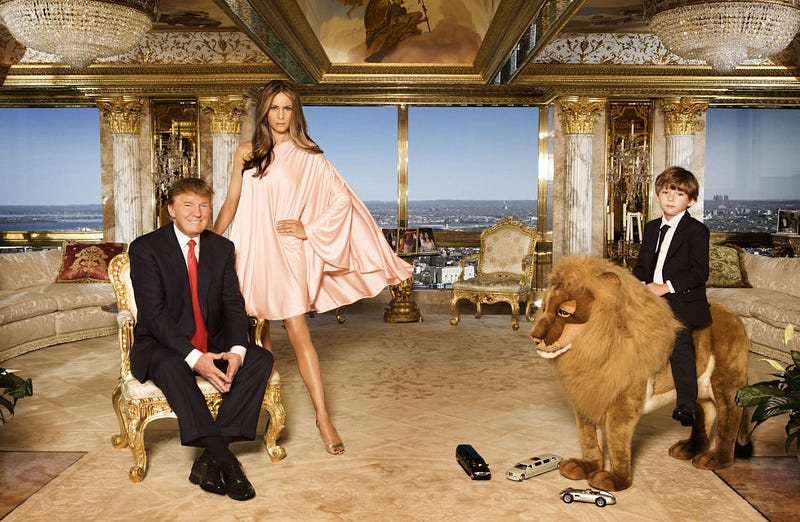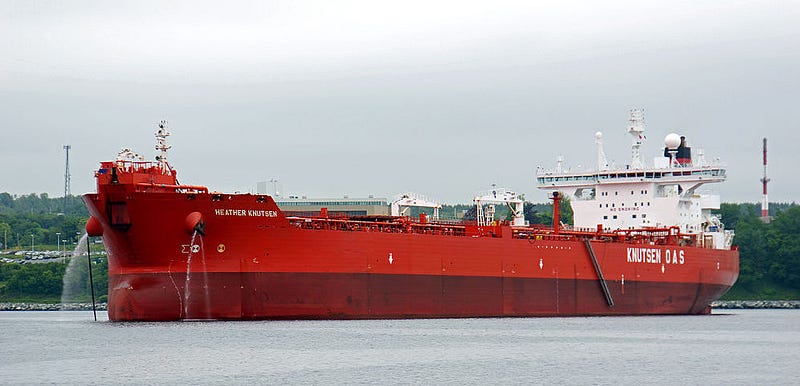 Photo by Gage Skidmore
Photo by Gage SkidmoreI’ve started to rewatch Trump rallies from the month before he was elected President. I’ve seen some of them before, but that was always with the presumption he was unlikely to win; now I watch them trying to figure out how he did it, and how the Democrats can rebuild their economic message out of this mess. There’s the virulent ethnic nationalism, but there’s also a way of approaching the economy that sabotages where Democrats are, even when they are strong.
There was a time I assumed if the Democrats “moved left” they could win over the working class, even those who don’t usually vote. Now, spending time thinking about agendas and messaging, I realize that this move is far more complicated than simply getting past neoliberalism. With Trump at the helm of the conservative movement for the foreseeable future, it’ll be even harder.
Watching Trump with fresh eyes shows that we need to think clearer about how our policy forces people to concede to changing social norms, how to convey the rich as the problem, how to have clear messaging, how to deal with trade, and how to deal with wages and power. I don’t have the answers, certainly not here and now; but getting the questions right is the first step.
Get Back, Way Back, to Work
Trump talked about jobs. All the time. This gets lost in the coverage, which focused on the inflammatory scandals. Watch:
“When I win on November 8th, I am going to bring back your jobs. The long nightmare of jobs leaving Michigan will be coming to an end. We will make Michigan the economic envy of the world once again. The political class in Washington has betrayed you. They’ve uprooted your jobs, and your communities, and shipped your wealth all over the world. They put new skyscrapers up in Beijing while your factories in Michigan crumbled. I will end the theft of American prosperity. I will fight for every last Michigan job.” -Donald Trump, Michigan, October 31st, 2016
It’s the first and most consistent thing he discusses. It’s implied it is a specific kind of job, a white, male, bread-winning manufacturing job. He doesn’t discuss “the economy” and how it could work for all, he doesn’t talk about inequality, he doesn’t talk about automation and service work; he makes it clear you will have a high-paying manufacturing job when he is President.
So what? Much of the Democratic platform is based on pushing through the fact that this political economy was anachronistic decades ago. As Daniel Rodgers writes, “Many of the economic planks in the Democratic Party program were not pitched” for Trump voters, who sensed the platform reflected that “that the culture wars had finally come home.” Family leave, child allowances, and universal pre-K acknowledge that we need to look beyond male breadwinners as the core economic unit. Fight for $15 is about turning service work into a decent, secure, working-class life. Efforts to try and disentangle commodities like health-care and retirement from employment run into the hope that employment would be sufficient to provide them. Voters won’t want to hear this.
2. Not Eating the Rich
Trump never blames the rich for people’s problems. He doesn’t mention corporations, or anything relating to class struggle. His economic enemies are Washington elites, media, other countries, and immigrants. Even when financial elites and corporations do something, they are a combination of pawns and partners of DC elites.
 21st Century Populism?
21st Century Populism?It’s important to watch that trick, of who has agency under runaway inequality. From a June speech in western Pennsylvania: “Our politicians have aggressively pursued a policy of globalization — moving our jobs, our wealth and our factories to Mexico and overseas. Globalization has made the financial elite who donate to politicians very wealthy. But it has left millions of our workers with nothing but poverty and heartache.” The rich buy politicians (and Trump can’t be bought) but he doesn’t turn around and denigrate those rich people.
Trump was smart to do so. As Joan C. Williams noted in an important essay, “the white working class (WWC) resents professionals but admires the rich.” The WWC doesn’t encounter rich people, but “professionals order them around every day. The dream is not to become upper-middle-class, with its different food, family, and friendship patterns; the dream is to live in your own class milieu, where you feel comfortable — just with more money.”
Now even if the WWC doesn’t resent the rich, Trump is likely to push it as far as it can go with a plutocratic administration. But there’s a reason his appointments aren’t sounding alarm bells right away, and it’s this logic. The media messed this up, assuming random vindictive statements amounted to policy, or not understanding how his tax plan worked, instead of seeing this consistent, deeper message.
We’ll need to do better putting populist energy against the bosses and owners. The mechanical, bloodless algebra of Piketty and income statistics probably won’t be enough by itself. We need a story of owners and investment to go with it. We need to talk about monopoly power, especially as Trump doesn’t take it up. Meanwhile we should feel out our own case against professionals. Tying professionals to commodification, the people who get in the way of needed goods (especially with whatever TrumpCare ends up looking like), might be a way to go there.
3. Policy, Policy Everywhere, Nor Any Drop to Drink
Trump and his team were a mess on campaign discipline. But when it comes to the economic platform in his speeches he remained disciplined and clear: he’s going to crush undocumented workers, roll back globalization, and cut taxes and regulations in DC. He has catch-phrases and symbols for each (the wall, rip up trade deals, drain the swamp), and it’s easy for his (white) voters to see how those line up with a better economic situation for themselves. As I’ve emphasized, this is what policy is, and Trump was fantastic at it.
What were Clinton’s three things to benefit workers? There was policy everywhere, but none of it clear for voters. An infrastructure deal, though would that even happen and didn’t Obama already try that? Anyway, Trump promised to do it twice as big. After that it wasn’t clear what was a priority.
Stuff that actually got to worker’s lives was technocratic and vague. “Short-termism” instead of the idea that bosses would rather give money to shareholders than invest. “Shadow banking” instead of Wells Fargo ripping you off and the CFPB stopped it. I use these terms — they are purposefully confusing because they need to mimic the nomenclature of microeconomics — but I’m not running a political campaign.
The sheer volume of it blurred out potentially useful items. When a really important fact sheet on fighting monopoly power was released, it got a paragraph 4,000 words into one speech (“As president, I will appoint tough, independent authorities to strengthen anti-trust enforcement and really scrutinize mergers and acquisitions, so the big don’t keep getting bigger and bigger”). It disappeared into a list of all the polices ever, rather than a clear statement of what was to be done. We need to remember a narrative of what has happened to workers and how we are going to fix it is more important than covering every potential base.
4. Trade
Trump is unapologetically against trade that harms American workers. I would have assumed he was fighting a straw man here, but one thing I’ve learned is how a certain class of liberals don’t approach job loss from trade with a regrettable sense of the trade-offs, but instead a more cutting sense that Americans don’t have any claim on the jobs that go away anyway. It’s all for the best, in the long-run.
The brilliant economist David Card gave me a useful point here during an interview: the divide among economists on trade is driven by the fact that labor economists study the real effects of unemployment on real people, where trade and macroeconomists treat people as just another commodity. (One of the people who broke the consensus on the effects of trade with China was David Autor, a leading labor economist. I had assumed from the literature the effects weren’t large enough before his writing.)
 Can you store some humans along with the oil you keep at sea?
Can you store some humans along with the oil you keep at sea?I’d phrase it this way: are people just like a barrel of oil? In the abstract models of trade economists, commodities like oil will always get sold at some price, they will get to where they need to get to do so, and they’re largely indifferent on the process. Even when commodity markets are off, oil can sit in tankers floating in the ocean waiting out price moves, and it makes no difference to the oil.
Oil doesn’t experience unemployment as the most traumatic thing that can happen to it. Oil moves magically to new opportunities, unlike people who don’t often move at all. A barrel of oil doesn’t beat their kids, abuse drugs, commit suicide, or experiencing declining life expectancy from being battered around in the global marketplace. But people do, and they have, the consequences persist and last, and now they’ve made their voices heard. It’s the the dark side of Polanyi’s warning against viewing human being as commodities.
For the life of me I don’t know why President Obama spent the summer of 2016 fighting hard for TPP when it was clear it was hurting Hillary Clinton, making her promise to pause trade deals not credible, and giving Trump live ammo. But he did. I don’t know if Trump or the people around him will be smart enough to use trade to split workers away from the Democrats much harder than they have, or if Democrats can come up with a better answer on trade and industrial policy that what they’ve done. But this is a live issue.
5. Taxes and Transfers and Places and Power
Trump also never mentions poverty. And while he talks a lot about reducing taxes, he never talks about increasing transfers, redistribution, or access to core goods. He talks about wages, full stop. He also talks about places. Dying towns that need revitalizing.
Democratic policy centers on poverty and transfers. There are a lot of reasons for this. Obviously, people in poverty are worse off than others, and there’s philosophical reasons to want a market system that allows for inequality as long as it benefits the worst-off in society.
But another reason is that you can measure this. I’m part of a group that wants to focus on getting wages up (the ugly term “predistribution”, but no longer using antagonistic term “pity-charity liberalism”) as a distinct yet complementary program to redistribution and also something that builds broader power for people. One obstacle I hit is that while getting wages up is a hazy and complicated process, redistribution can be done and measured with clinical precision.
It can also be taken away with that same precision. “Post-tax-and-transfer” inequality, the thing everyone was cheering as the way forward, is going to be a major causality in the next four years, probably the next 8 months even, conceptually as a Trump administration doesn’t think that way at all, and practically as the conservatives destroy transfers and progressive taxation. Getting a clearer strategy and narrative around pushing wages up, and getting a fuller agenda around places left behind, needs to be centered more than it is.
Going Forward
There are a lot of reasons Clinton lost. There was some made-up wishful thinking in retrospect: her unfavorables were “priced-in”, I heard, which isn’t a thing. What I haven’t seen an answer for is that for all the money and tech, they didn’t know their blue wall was much less safe from the people on the ground than the polling numbers in Brooklyn HQ would see. Something broke down there and it’s urgent to understand why.
But even without that loss there would have been a need to reboot. As Ezekiel Kweku writes in an excellent article, “The lesson we should draw from Clinton’s loss is not that white supremacy is unbeatable at the polls, but that it’s not going to beat itself…If the Democratic Party would like to keep more Donald Trumps from winning in the future, they are going to have to take the extraordinary step of doing politics.” Politics is informed by analysis and policy, and though it is clear we need policy to move beyond neoliberalism, that is only the first step. The journey to find this new path is just beginning.